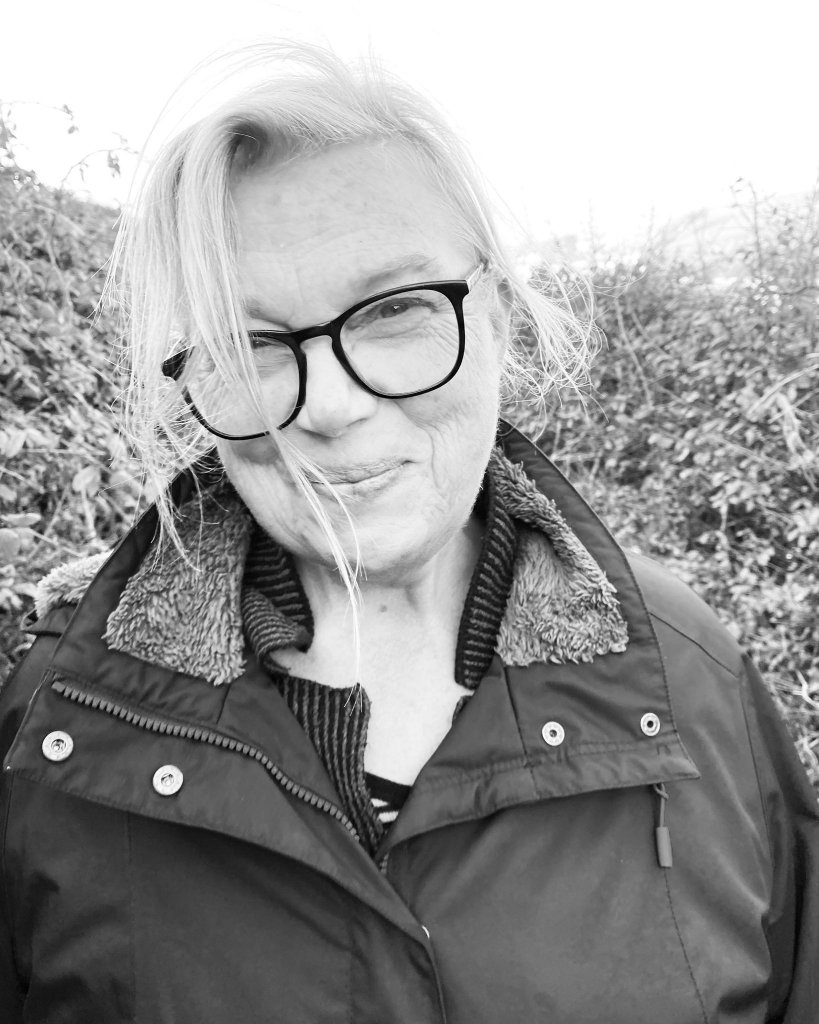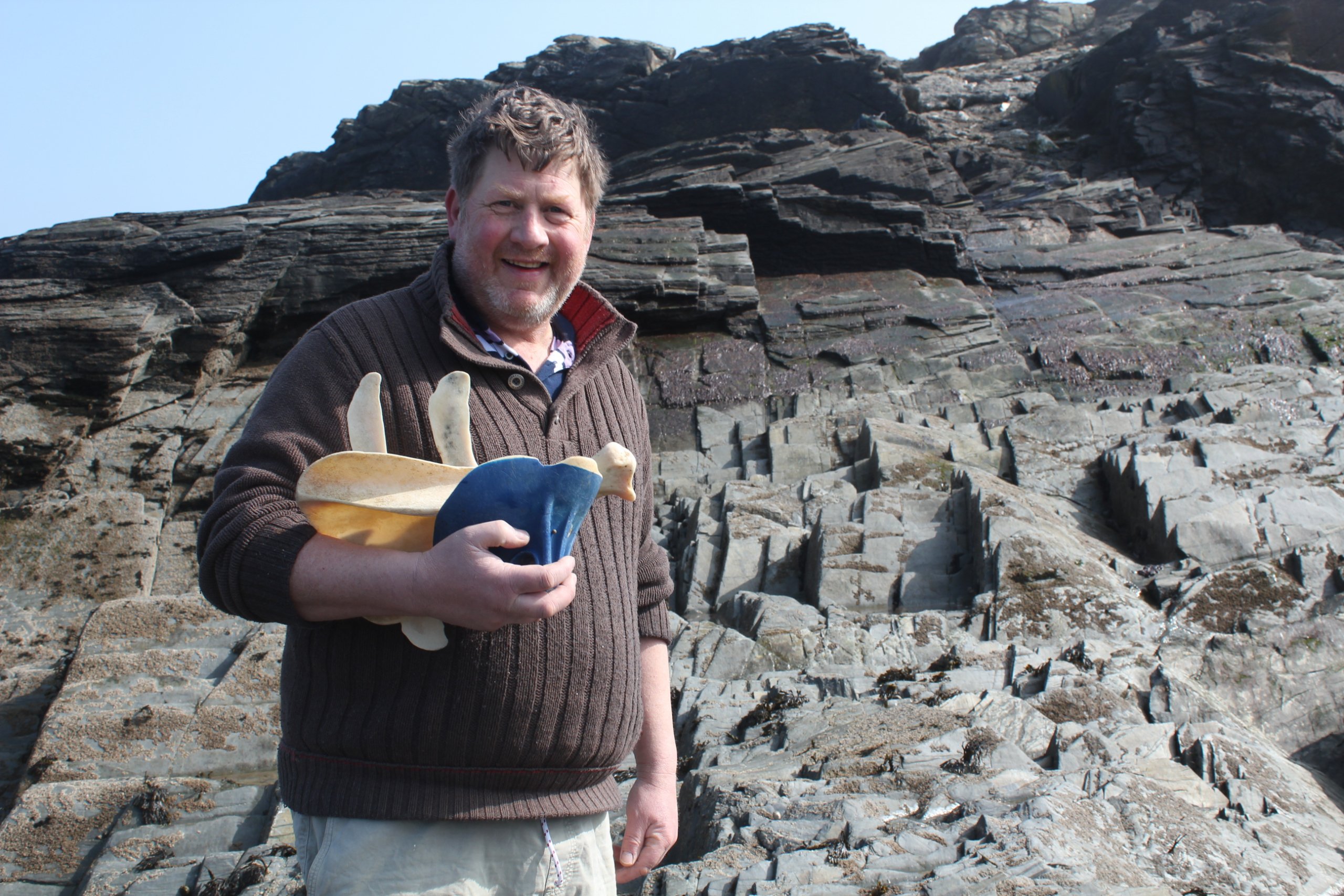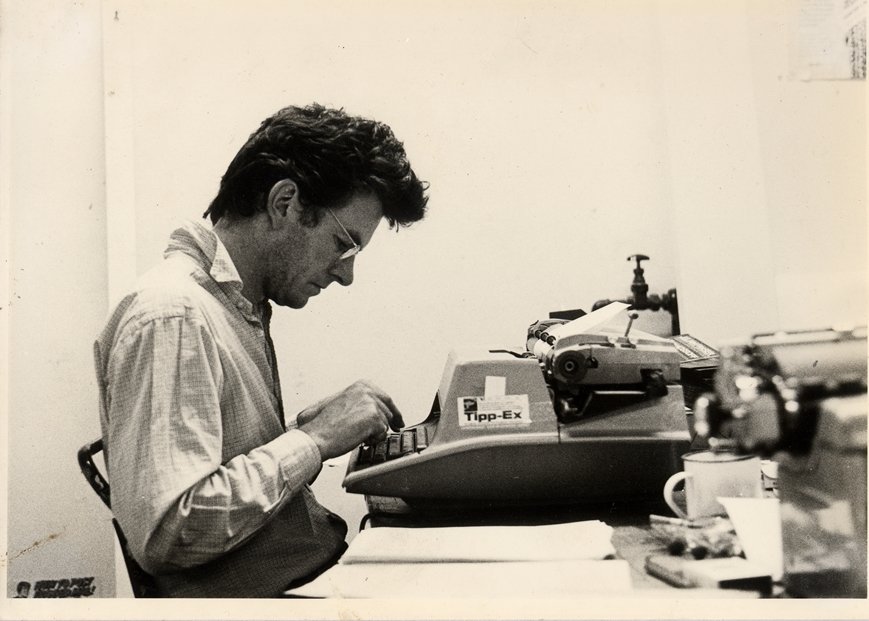
Jane Darke
Call Jane on: 01841 520393 Email jane at: janesdarke@gmail.com or use the site Contact Form
Jane trained as a textile artist producing hand painted lengths of cloth at Middlesex Poly, BA hons, then started painting at the RCA, and was given an MA. She continued to paint and worked as a gardener, had two children with playwright Nick Darke. For two years the family lived off grid in woods, 1984-6. When they moved to Cornwall in 1990, where Nick was born, they began to scavenge anew.
Jane Darke is a documentary director, painter and writer. She made a film about Atlantic debris with playwright Nick Darke about their collection of found objects and connections made through them with the eastern seaboard of the Americas, as well as Cornish fishermen and wreckers, The Wrecking Season, 2005. It was the first film to be broadcast to mention plastic pollution of the seas. The Art of Catching Lobsters, about grief, was made after Nick died in 2009. Her most recent film was about the Poet Charles Causley (2017). All were broadcast on BBC FOUR. Her book Held by the Sea was published by Souvenir Press in 2010, about the healing power of landscape. Jane has also made several radio programmes for BBC Radio 4.
She now works and exhibits at Tregona Chapel, St Eval, on the North Coast of Cornwall, where she curates St Eval Archive a collection of recorded memory and digitised photographs, and lately a herbarium, of the parish of St Eval, gathered by herself and partner Andrew Tebbs. There they hold teas and workshops for the community.
At the moment she’s working on a new film about Nick Darke’s influence, since death, on the creative lives of others. She’s also working on a book, written in non-academic language, with easily accessed references, about our planet: natural history, general science, history and religion and how we got to where we are now – a view of the world from sea level, in Britain. Her paintings group found objects, from the sea, together, in a satisfactory manner.
Andrew Tebbs
Contact Andrew via the site Contact Form
I am a fine art /sculptor with a degree from Sheffield Hallam University. I have worked freelance, commissions of art in the public realm and delivering participatory projects. I have much experience working as an Artist, Lead Artist, Project Coordinator and in Project Management of Art Installations. I have executed over 40 projects in various roles for Junction Arts, based in Chesterfield (Arts Council regularly funded organisation) Also for Bolsover District Council, public arts program (funded by planning 106) 14 public sculptures. Bassetlaw District Council Arts Festival, Sheffield City Council – Schools Residency Childrens Festival. Lead Artist for the Visual Art stream – Galley 37 and Newark and Sherwood District Council. Further details see my cv: Andrew Tebbs CV
Notable projects completed include creating a memorial for ‘unsung heroes’ in Clowne, Derbyshire, a new sculpture and gathering space for the Clowne Cenotaph, funded jointly by Bolsover District and Clowne Town Councils, 2015. Commissioned in 2016 by the Bosnian and Herzegovina centre, Derby, to carve a stone sculpture to mark 21 years since the Srebrenica genocide, their funding came from the Big Lottery Fund and BBC Children in Need.
During 2018 I was curator for Black Dyke Brass Band, Queensbury helping them establish a heritage centre and using purpose designed arts awards sessions to engage with local schools. This project was funded by the Heritage lottery fund.
From 2010 to the present I have been co curator of St Eval Archive, we have been funded by FEAST Cornwall, Cornwall Community Foundation. We run a program of summer art events, workshops and teas for the local community, who have little access to cultural activities because of rural isolation.


Nick Darke
Visit Nicks website for more info: https://nickdarke.net/ or contact Jane via the Contact Form
Nicholas Temperley Watson Darke (29th August 1948 – 10 June 2005), known to all as Nick, was born in Porthcothan in the parish of St Eval, near Padstow in North Cornwall, in a house on the beach. His father T.O. (Bob) Darke was a farmer. The farm was a mile up the road in Treburrick. He had 100 acres. Bob was also an ornithologist, a founder of the Cornwall Wildlife Trust. He owned a printing press in Penzance (Darke Johnson Ltd). Nick’s mother was the actress Betty Cowan, born in Hampstead, London.
Nick grew up on the beach, had his own boat when he was 10 and learned to fish with his father. The family had a long connection with the sea. Bob went twice round the world before he was seventeen as a merchant seaman; his grandfather was a sea captain, wrecked twice off the Cape of Good Hope. His great grandfather was the owner of a shipping firm Temperley Carter and Darke, operating out of the East India Docks in London.
Nick went to St Merryn Primary School and then to Truro Cathedral School. He rebelled against the system of random violence and bad food. He was expelled for getting drunk on sports day. He went to Newquay Grammar, learned to surf and ran the first disco in Cornwall from the cellar bar of the Atlantic Hotel, playing Northern soul records he bought from hotel workers from Manchester.
He went to Rose Bruford College, in Sidcup, to study acting. His first job was touring Sweden, then repertory in the Lyric Belfast, during ‘The Troubles’. He learned his craft at The Victoria Theatre, Stoke on Trent. It employed a permanent company of actors. The theatre was in the round with 400 seats. Nick acted in over 80 plays, the classics and new plays, often working with the writers. He said the best advice you can give a novice playwright is ‘go and be an actor’. He directed Man is Man, The Miser, Absurd Person Singular, The Scarlet Pimpernel and A Cuckoo in the Nest.
He had always written. He sent sketches to the comedians Morecombe and Wise which they didn’t use. He wrote his first play for the theatre at Stoke. During this time he lived with the theatre designer Alison Chitty.
He gave up acting to write in 1978. He won the George Devine award in 1979. His work attracted further commissions. Everything he wrote for theatre was produced – twenty seven plays in twenty eight years. They are performed and translated throughout the world. He also wrote for radio, television and wrote several screenplays.
Most of his work reflects Cornish culture. When he was growing up the Cornish were a majority. He said in 1978: ‘I would like to write more about Cornwall because it’s what I know and where most of my experiences are. There is a huge area of life, past and present which needs to be written about.’
He met his wife Jane in 1980. They have two sons; Jim is a marine scientist, Henry a filmmaker and writer.
He moved back to Cornwall in 1990 and got on with the life of his childhood, fishing and wrecking (beachcombing). He kept lobster pots and scoured the beaches for anything of interest.
In 2001 he had a stroke which affected his speech and reading and writing. He and Jane made a film, The Wrecking Season, about the contacts he made tracing fishing gear back to the East coast of America. It’s a film about the North Atlantic community and Cornwall’s place within it.
He died of cancer in 2005, aged 56. His funeral was on the beach. He and Jane filmed the last few months of his life. She made the film The Art of Catching Lobsters about their life together and the grieving process.

